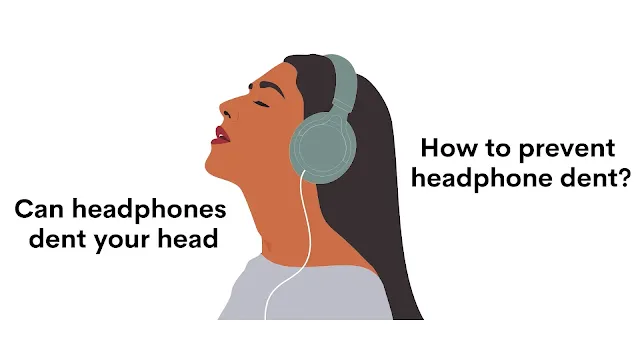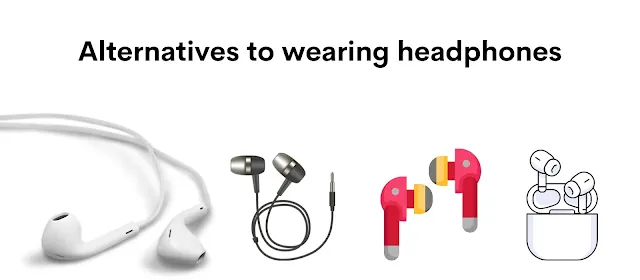Can headphones dent your head? Learn how to prevent it
We all love to listen to our music with a good pair of headphones, but have you ever wondered if they can cause damage to your head in the long run? Unfortunately, the answer is yes – prolonged use of headphones can lead to permanent indentations in your head.
This blog post will discuss the causes and effects of headphone-induced dents, as well as ways you can prevent them from happening.
So, read on to learn more about how headphones can damage your skull and what steps you can take to protect yourself.
What is a headphone dent?
A headphone dent is a mark left on your skin after wearing headphones for an extended period. It is caused by the pressure of the headphones against your skin and can be uncomfortable or even painful.
Symptoms of headphone dent
Anytime you feel any of the following symptoms, you may have headphone dent:
- Pain or discomfort in the area where your headphones make contact with your head
- Frequently headaches
- Tenderness or soreness in the affected area
- A visible indentation in your skin from where the headphones sit on your head
If you suspect a headphone dent, you must see a doctor as soon as possible. While it is not a serious condition, it can be painful and uncomfortable. If left untreated, a headphone dent can lead to more serious problems like infections.
Causes of headphone dent
One of the main causes of headphone dent is wearing headphones for too long. It can cause the pressure from the headphones to build up and eventually dent your head.
Another cause of headphone dent is using headphones that are too tight. It can also lead to pressure build-up and eventual dents. That's why it is important to take breaks from wearing headphones and to loosen them if they start to feel tight.
Types of headphones and their effects on head dents
There are three main types of headphones: earbuds, on-ear, and over-ear. Each type of headphone has a different effect on the head and can cause different types of dents.
Earbuds: Earbuds sit outside of the ear canal and don't make direct contact with the ear. They are generally less likely to cause dents than other headphones, but they can still put pressure on the outer ear and cause discomfort.
On-ear: On-ear headphones sit on top of the ear and make direct contact with it. They can cause dents in the cartilage if worn for long periods or if they are too tight.
Over-ear: Over-ear headphones go around the ear and rest on the head. They can cause dents in the soft tissue if they are too tight or worn for long periods.
How to prevent headphone dent?
A headphone dent is a condition that can be caused by wearing headphones for extended periods. The pressure from the headphones can cause the cartilage in your ears to collapse, leading to a permanent indentation in your head.
Some things you can do to prevent headphone dent:
1) Limit the amount of time you wear headphones each day. If you must wear them for long periods, take breaks every few hours to rest your ears.
2) Avoid wearing headphones that are too tight. Eartips should be snug but not so tight that they put unnecessary pressure on your ears.
3) When not using your headphones, store them properly so they don't become bent or distorted. It will help to preserve their shape and prevent them from causing headphone dents.
4) Wear headphones that fit snugly but are not too tight. It will help distribute the pressure more evenly and reduce the chance of a dent.
5) Take breaks from wearing headphones every few hours. It will allow your skin to recover from the pressure and avoid permanent damage.
6) Use headphones with soft, cushioned ear cups. It may minimize the pressure on your skin and reduce the risk of a dent.
Alternatives to wearing headphones
There are a few alternatives to wearing headphones that can help prevent headphone-induced denting of the head. One alternative is to use earbuds instead of headphones. Earbuds fit snugly into the ear canal and don't put pressure on the sides of the head as headphones do.
Another alternative is to use wireless headphones. Wireless headphones don't have any cords that can add weight or pull on the head, which can contribute to headphone-induced denting.
Finally, another alternative is to take breaks from using headphones throughout the day. It will give your head a chance to recover from any potential headphone-induced pressure and hopefully avoid permanent damage.
Conclusion
Headphones contain fewer health risks from wearing them for a long period. There are various ways to reduce the risk, such as avoiding long periods of headphone use and ensuring that your volume is turned down enough so that it won't cause any damage.
If you experience any uncomfortable sensations or pain when wearing headphones for an extended period, give yourself a break and take them off for a while. Your ears (and head) will thank you!




![Starlink Residential Lite Plan Review: Price, Speeds & Installation [2025]](https://blogger.googleusercontent.com/img/b/R29vZ2xl/AVvXsEiZ5F4iyM8wYcBghcRHqf-sWEjiv4_VXvD7G1ycqm7C-7Le9cMBdTGDiZWGiGf8U1UfZ2O_svHa3uRJJoaOqchBzj4m_EqWn3LcMiY6iwYQiw3lCTnTFF86y2Uhy08iQnAzWVXDbucJ5gxgs6DaF8LwR0blSYaMD3aIeqf6OfxTtVQ-IceWJAVmKT0szG2A/w640-h426/Starlink%20Residential%20Lite%20Plan%20Review%20Price%20Speeds%20&%20Installation%20%5B2025%5D.png)
![Google Fiber 8 Gig Plan: Pricing, Router Setup & Real-World Speeds [2025]](https://blogger.googleusercontent.com/img/b/R29vZ2xl/AVvXsEi6_qJNt_RvZC1JwQNNF6bBzU0c2FGCYzE6Mm0ZYzdV8-I4XVsyYmAOV20pYLgNBMHh9oxUL-N_Mtf3FknK_CF3hKvTXjF5lDtKlsYR6uVF0tjAnrF0nntZtKeq5i2Ew8HATrCphVi2qo2vtjprcQYNdSHfOGFquauxU_e1sbG0CW1070Xsq8m_rW7OGLSm/s16000/Google%20Fiber%208%20Gig%20Plan%20Pricing,%20Router%20Setup%20&%20Real%E2%80%91World%20Speeds%20%5B2025%5D.png)

![iPhone 16e Trade-In Deals at T-Mobile: Best Offers & Upgrade Guide [2025]](https://blogger.googleusercontent.com/img/b/R29vZ2xl/AVvXsEgSiUZbAoOFf9UujQbD8E71wy5ILM6EZCZoKC2P0_fd1BEA_Wq70nbBbvf6in35Zf3FMlVdMR1gIDEgy7H16VCJ3WpptxCmFrSl2frJyf60RddD9LTBbx9mQu-I4I4ABVZk178qbiz0UNix5T3bMpcxf2L0OBqVxlGi7hRpU09g5ghDNAL5arr1-M0oHq6b/w640-h640/iPhone%2016e%20Trade%E2%80%91In%20Deals%20at%20T%E2%80%91Mobile%20Best%20Offers%20&%20Upgrade%20Guide%20%5B2025%5D.png)
![Verizon Apple Watch: Best Deals, Plans & Setup Guide [2025]](https://blogger.googleusercontent.com/img/b/R29vZ2xl/AVvXsEiVB0MY4Swj12TnvdsgphjnwOixATJv9KJBcF4JTEy29L_foLhv5razo_QlPf_cEVOxMVW1laaNfG2_H0W672Sa5NnDS8WtTopHepfHH94uNAWOBO6QSEo1oi5U-JcMFbDZrPAitOKao3VB0wVLUS4QV7OgmoaWksu12CYy231ym0RTx629HxKfnGpRZU2G/w640-h362/Verizon%20Apple%20Watch%20Best%20Deals,%20Plans%20&%20Setup%20Guide%20%5B2025%5D.png)